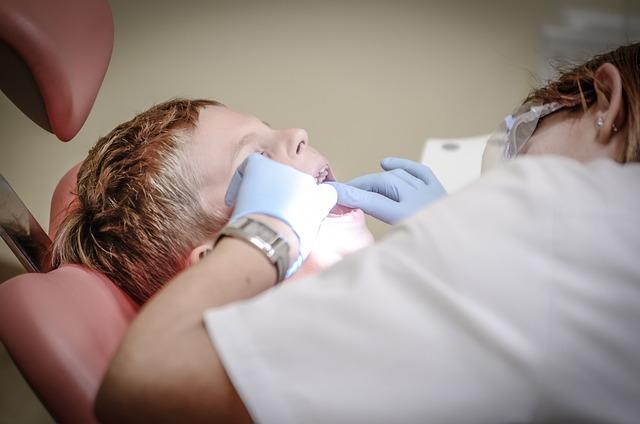Can I Have Salt After Wisdom Teeth Removal? Dental Advice
Wisdom teeth removal is a rite of passage for many of us, often accompanied by a series of questions about what we can and cannot do during the recovery process. One particular inquiry that frequently arises post-surgery is whether it’s safe to indulge in that ubiquitous condiment: salt. As you embark on your journey towards a speedy recovery, it’s crucial to arm yourself with accurate dental advice. In this article, we will delve into the topic, providing you with confident, knowledgeable, and neutral insights to help you make an informed decision regarding salt consumption after wisdom teeth removal. So let’s dive in without hesitation and uncover the truth behind this salty dilemma.
1. Understanding the Healing Process: Salt and Wisdom Teeth Removal
The healing process after wisdom teeth removal can vary from person to person. It is important to understand the steps involved in order to ensure a smooth recovery. One aspect of this healing process is the use of saltwater rinses. These rinses help clean the surgical site, reduce inflammation, and prevent infection. To make a saltwater rinse, mix half a teaspoon of salt in a cup of warm water. Gently swish the solution in your mouth for about 30 seconds, then spit it out. Repeat this rinse 2-3 times a day for the first few days after the procedure.
- Another key element in the healing process is proper oral hygiene. It is crucial to keep the surgical area clean to prevent complications and promote healing. Brush your teeth gently with a soft-bristled toothbrush, being careful to avoid the surgical site. You can resume normal brushing after a few days, but be gentle and avoid any vigorous brushing that may disrupt the healing process.
- It is also important to stick to a soft-food diet during the initial days of recovery. Opt for foods like yogurt, mashed potatoes, smoothies, and soups. Avoid hard, chewy, or spicy foods that may irritate the surgical site. Additionally, avoid using a straw, as the suction can dislodge the blood clot and delay healing.
By understanding and following these steps, you can support the healing process after wisdom teeth removal and minimize any discomfort or complications. If you have any concerns or experience excessive pain or swelling, it is essential to contact your dentist or oral surgeon for guidance.

2. Navigating Post-Operative Care: Salt Consumption After Wisdom Teeth Extraction
After undergoing wisdom teeth extraction, it is important to carefully manage your salt consumption to ensure a smooth recovery. Excessive salt intake can lead to complications such as swelling, discomfort, and delayed healing. To navigate post-operative care effectively, consider the following recommendations:
- Monitor your sodium intake: Keep track of the amount of salt you consume daily. It is generally recommended to limit your sodium intake to less than 2,300 milligrams per day. This can help minimize swelling and promote faster healing.
- Avoid high-sodium foods: Stay away from processed and packaged foods that are typically high in sodium content. These include chips, canned soups, deli meats, and fast food. Opt for fresh, whole foods instead, which are generally lower in sodium.
- Choose low-sodium alternatives: When preparing meals, opt for low-sodium options, such as using herbs and spices to flavor your dishes instead of salt. Additionally, look for low-sodium versions of condiments like soy sauce or salad dressings.
- Stay hydrated: Drinking an adequate amount of water can help flush out excess sodium from your body. Aim to drink at least 8 cups (64 ounces) of water per day to stay properly hydrated.
- Consult your dentist or oral surgeon: If you have any concerns or questions about your salt intake during the recovery period, it is always best to consult with your dentist or oral surgeon. They can provide personalized advice based on your specific condition and needs.
By being mindful of your salt consumption and following these guidelines, you can promote a smooth recovery after wisdom teeth extraction. Remember, a healthy diet and proper care are key to a successful healing process.
3. The Impact of Salt on the Healing Process: Expert Insights
Salt has long been used as a remedy for various ailments, but its impact on the healing process is a topic of much debate among experts. While some believe that salt can aid in healing wounds, others argue that it may have adverse effects. Here, we present insights from experts to shed light on the subject.
1. Salt as an antimicrobial agent: One of the main reasons why salt is believed to aid in the healing process is its antimicrobial properties. It has been found to inhibit the growth of certain bacteria, thereby reducing the risk of infection in wounds. This is especially true for saltwater solutions, which are commonly used for wound cleansing.
2. Potential drawbacks of salt use: Despite its potential benefits, experts caution against excessive salt use in the healing process. High salt concentrations can have a drying effect on the skin, leading to delayed wound healing. Additionally, some individuals may be sensitive to salt or have underlying health conditions that could be aggravated by its application. It is important to consult a healthcare professional before incorporating salt into your healing routine.
3. Finding the right balance: The key to harnessing the potential benefits of salt while mitigating any drawbacks lies in finding the right balance. Moderation is crucial, and it is advisable to follow the guidance of healthcare professionals when using salt for healing purposes. They can provide personalized recommendations based on the specific nature and severity of your wound.
4. Fact or Fiction: Debunking Myths About Salt After Wisdom Teeth Removal
After wisdom teeth removal, there are several myths surrounding the consumption of salt. Let’s debunk them and get to the facts:
Myth 1: Avoid all forms of salt after wisdom teeth removal.
This is not entirely true. While it’s important to avoid excessive salt intake, a moderate amount of salt can actually be beneficial in maintaining oral health. Saltwater rinses, made by dissolving half a teaspoon of salt in eight ounces of warm water, can help reduce swelling and promote healing. Just be sure not to swallow the solution.
Myth 2: Salt can cause dry socket.
Contrary to popular belief, salt itself does not cause dry socket. Dry socket is a condition that occurs when the blood clot in the socket where the tooth was extracted becomes dislodged or dissolves, exposing the underlying bone and nerves. While saltwater rinses can be helpful, it’s important to be gentle when swishing the solution in your mouth to avoid dislodging the blood clot.
Myth 3: Salt can speed up the healing process.
While saltwater rinses can promote healing by reducing inflammation and preventing infection, they do not magically speed up the healing process. After wisdom teeth removal, it’s crucial to follow proper oral hygiene practices, including gentle brushing and rinsing with saltwater, to support the natural healing process and avoid complications.
5. Promoting Optimal Healing: The Role of Salt in Post-Surgical Recovery
Salt plays a crucial role in promoting optimal healing during the post-surgical recovery period. While it is often associated with negative health effects, when consumed in moderation, salt can actually aid in the recovery process. Here are some key ways in which salt can contribute to a speedy and successful recovery:
- Electrolyte balance: Salt, or sodium chloride, is a vital electrolyte that helps maintain fluid balance in the body. After surgery, electrolyte imbalances can occur due to changes in fluid levels. Consuming a controlled amount of salt can help restore the electrolyte balance, ensuring proper hydration and normal cell function.
- Wound healing: Salt has antimicrobial properties that can help prevent infections in surgical wounds. By creating a saline solution, salt can be used to cleanse and disinfect wounds, promoting a clean environment for healing. This can aid in reducing the risk of complications and supporting the body’s natural healing mechanisms.
- Reducing inflammation: Inflammation is a natural response to surgery, but excessive inflammation can impede the healing process. Salt can help regulate inflammation by maintaining proper fluid balance and supporting the functioning of the immune system. This can contribute to a faster recovery and minimize discomfort.
It is important to note that while salt can be beneficial for post-surgical recovery, it should always be consumed in moderation. Excessive salt intake can lead to fluid retention and elevate blood pressure, which may be detrimental to the healing process. Consult with your healthcare provider to determine the appropriate amount of salt to incorporate into your diet during recovery.
6. Guidelines for Salt Intake After Wisdom Teeth Extraction: What You Need to Know
After wisdom teeth extraction, it is crucial to follow specific guidelines to promote proper healing and minimize discomfort. One important aspect to consider is your salt intake. Here are some key points to keep in mind:
- Avoid excessive salt consumption: Consuming excessive amounts of salt can lead to inflammation and delay the healing process. It is advisable to limit your salt intake during the initial days following the extraction.
- Opt for a saltwater rinse: A saltwater rinse can help keep the extraction site clean and prevent infection. Mix half a teaspoon of salt in a glass of warm water and gently swish the solution in your mouth for about 30 seconds, making sure not to spit or rinse too forcefully.
- Choose salt-free or reduced-salt options: While it’s important to limit salt intake, you can still enjoy flavorful meals. Opt for salt-free or reduced-salt options when seasoning your food to enhance taste without compromising your recovery.
Following these guidelines will help ensure a smooth recovery after your wisdom teeth extraction. Remember to consult your dentist or oral surgeon for personalized advice based on your specific situation.
7. Balancing Flavor and Healing: Finding the Right Salt Consumption Post-Surgery
After undergoing surgery, it is important to strike a balance between flavor and healing by carefully managing your salt consumption. While salt is a common ingredient in many dishes, excessive consumption can lead to complications and hinder the healing process. Here are some key points to consider when finding the right amount of salt to consume post-surgery:
- Consult with your healthcare provider: Before making any dietary changes, it is crucial to consult with your healthcare provider or nutritionist. They will be able to provide personalized guidance based on your specific needs, medical history, and the type of surgery you underwent.
- Avoid excessive sodium intake: Consuming too much sodium can lead to fluid retention, high blood pressure, and other health issues. It is recommended to limit your daily salt intake to less than 2,300 milligrams (about one teaspoon). However, your healthcare provider may recommend a lower limit depending on your condition.
- Focus on natural and low-sodium alternatives: Instead of relying on table salt, explore other options such as herbs, spices, and salt substitutes to enhance the flavor of your meals. Fresh herbs like basil, thyme, or rosemary can add a burst of taste without the need for excess salt. Additionally, low-sodium or salt-free seasonings can be a great way to add flavor while keeping your sodium intake in check.
Remember, finding the right salt consumption post-surgery is essential for your overall health and healing. By being mindful of your sodium intake and exploring alternative flavors, you can strike the perfect balance between taste and your recovery process.
8. Supporting Your Recovery: The Benefits and Risks of Consuming Salt After Wisdom Teeth Removal
After undergoing wisdom teeth removal, it is important to support your recovery by making appropriate dietary choices. One common concern is the consumption of salt, as it can have both benefits and risks during the healing process.
Let’s start with the benefits of consuming salt after wisdom teeth removal:
- Promotes healing: Saltwater rinses can help reduce inflammation and prevent infection in the extraction site.
- Relieves discomfort: Gargling with warm saltwater can provide temporary relief from soreness and pain.
- Mineral balance: Salt contains essential minerals like sodium and chloride, which are crucial for maintaining electrolyte balance in the body.
Despite these benefits, it is essential to be aware of the potential risks associated with excessive salt consumption:
- Increased swelling: Consuming too much salt can lead to water retention and contribute to swelling in the extraction area.
- Delayed healing: Excessive salt intake may hinder the healing process and prolong recovery time.
- High blood pressure: Individuals with hypertension or a history of cardiovascular problems should be cautious with salt intake, as it can elevate blood pressure levels.
It is crucial to strike a balance by consuming an appropriate amount of salt to reap the benefits while minimizing the risks. Consult your dentist or oral surgeon for personalized advice regarding salt intake and other dietary considerations during your recovery.
9. Making Informed Choices: Considering Salt Consumption During the Recovery Period
During the recovery period, it is crucial to make informed choices about salt consumption. Excessive salt intake can negatively impact the body’s healing process and prolong recovery time. Here are some important considerations to keep in mind:
- Evaluate your daily salt intake: Start by assessing how much salt you consume on a daily basis. This can be done by reading food labels and being mindful of the amount of salt you add during cooking or at the table. Aim to stay within the recommended daily limit, which is typically around 2,300 milligrams or less.
- Understand the risks: Excessive salt intake can lead to increased blood pressure, fluid retention, and inflammation. These factors can hinder the healing process and lead to complications. By being aware of the risks, you can make conscious choices to reduce your salt consumption during the recovery period.
- Choose low-sodium alternatives: Opt for low-sodium options when available. This includes selecting fresh fruits and vegetables, lean proteins, and whole grains. Be cautious of processed foods, as they often contain high levels of sodium. Additionally, using herbs, spices, and other flavor enhancers can help reduce the need for excessive salt in your meals.
- Consult your healthcare provider: If you have specific dietary restrictions or concerns, it is advisable to consult your healthcare provider. They can provide personalized advice tailored to your recovery needs and help you make informed choices regarding your salt consumption.
By considering your salt consumption and making informed choices, you can support a faster and smoother recovery process. Remember to prioritize your health and wellbeing by being mindful of the amount of salt you consume during this crucial period.
10. Expert Advice: Understanding the Relationship Between Salt and Successful Wisdom Teeth Extraction Recovery
When it comes to recovering from wisdom teeth extraction, understanding the relationship between salt and successful recovery is crucial. Saltwater rinses can play a significant role in promoting healing and reducing discomfort. Here are some expert tips to help you navigate this important aspect of your recovery:
- Timing: Begin saltwater rinses 24 hours after your surgery. This allows the initial bleeding to subside and minimizes the risk of dislodging any blood clots.
- Recipe: Mix 1/2 teaspoon of salt with 8 ounces of warm water. Stir until the salt is dissolved completely.
- Rinsing technique: Take a small sip of the saltwater solution and swish it gently around your mouth for about 30 seconds. Spit it out and repeat this process until you have used the entire solution.
- Frequency: Aim to rinse your mouth with saltwater at least 2-3 times a day, especially after meals. This will help keep the extraction site clean and reduce the risk of infection.
Remember, always follow your dentist’s specific instructions for saltwater rinses, as individual cases may vary. By incorporating this expert advice into your recovery routine, you can promote healing, alleviate discomfort, and ensure a successful wisdom teeth extraction recovery.
Frequently Asked Questions
Q: Can I have salt after wisdom teeth removal?
A: Yes, you can have salt after wisdom teeth removal, but it’s important to exercise caution and follow the recommendations of your dentist or oral surgeon.
Q: Why is it important to be cautious with salt after wisdom teeth removal?
A: Salt can cause discomfort and irritation to the surgical site if it comes into direct contact with the extraction site. It can also potentially delay the healing process or lead to complications.
Q: How should I use salt after wisdom teeth removal?
A: While it’s generally advised to avoid direct contact of salt with the extraction site, you can still consume salt in your diet through food that doesn’t require excessive chewing. It is advisable to opt for softer foods during the initial healing period.
Q: Are there any specific foods that I should avoid?
A: Yes, it is advisable to avoid foods that are excessively salty or require a lot of chewing, as these can potentially irritate the surgical site and cause discomfort. Opting for softer foods such as soups, mashed potatoes, or smoothies can be more beneficial during the healing process.
Q: Is rinsing with saltwater safe after wisdom teeth removal?
A: While rinsing with saltwater can have potential benefits in terms of promoting healing and reducing discomfort, it’s important to consult with your dentist or oral surgeon before doing so. They can provide you with specific instructions tailored to your unique situation.
Q: How soon can I start using saltwater rinse after wisdom teeth removal?
A: The timing for starting saltwater rinses can vary depending on the individual and the specific instructions provided by your dentist or oral surgeon. Typically, they may recommend waiting at least 24 hours after the surgery before starting saltwater rinses. It’s important to follow their guidance to ensure a smooth recovery.
Q: Can saltwater rinses replace regular dental hygiene practices?
A: No, saltwater rinses should not replace your regular dental hygiene practices. It is important to continue brushing your teeth gently, but avoiding the surgical area, to maintain overall oral health during the healing process.
Q: What are the potential risks of using salt after wisdom teeth removal?
A: The main risk associated with using salt after wisdom teeth removal is the potential for irritation or discomfort at the surgical site. This can lead to delayed healing or other complications. Following your dentist’s or oral surgeon’s instructions and being mindful of your diet can help minimize these risks.
Q: How long should I be cautious with salt after wisdom teeth removal?
A: It is generally recommended to exercise caution with salt and any other potential irritants for at least one to two weeks following wisdom teeth removal. However, the specific timeline may vary for each individual, so it’s crucial to consult with your dental professional for personalized advice.
Q: When can I resume a normal diet after wisdom teeth removal?
A: The timing for resuming a normal diet can vary depending on the individual and the complexity of the extraction. Your dentist or oral surgeon will provide specific guidance on when it is safe to reintroduce certain foods into your diet. It’s important to prioritize your oral health and follow their recommendations for a smooth recovery.
Key Takeaways
In conclusion, the journey to recovery after wisdom teeth removal can be a challenging one, but it’s important to arm yourself with the right knowledge and guidance. While salt can provide some relief and aid in the healing process, it is crucial to exercise caution and follow your dentist’s instructions. Remember, moderation is key when it comes to salt intake, as excessive amounts may hinder your recovery. Be mindful of your body’s signals and listen to your dentist’s advice to ensure a smooth and successful healing process. Ultimately, your oral health is of utmost importance, so take the necessary steps and make informed decisions to promote a speedy recovery.






